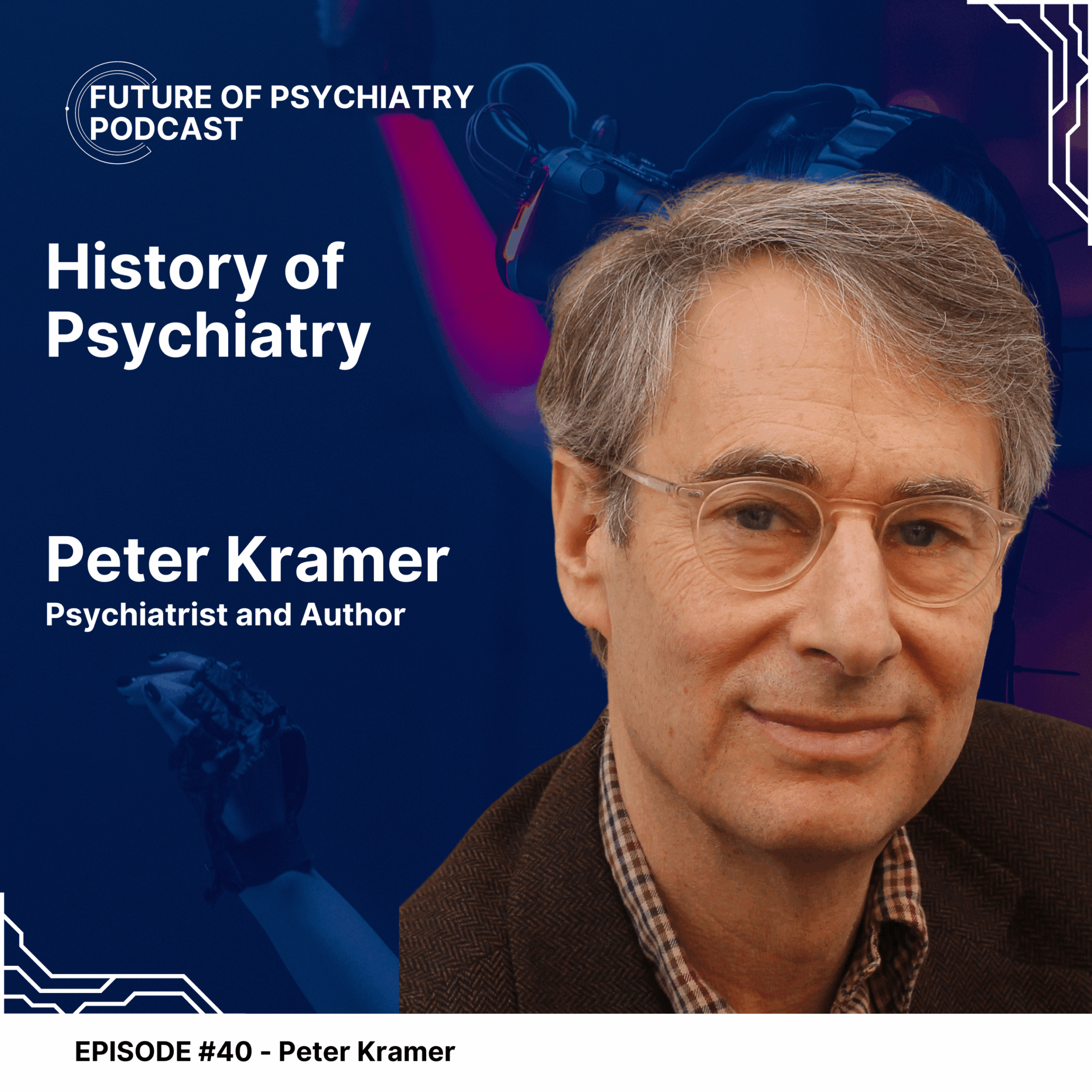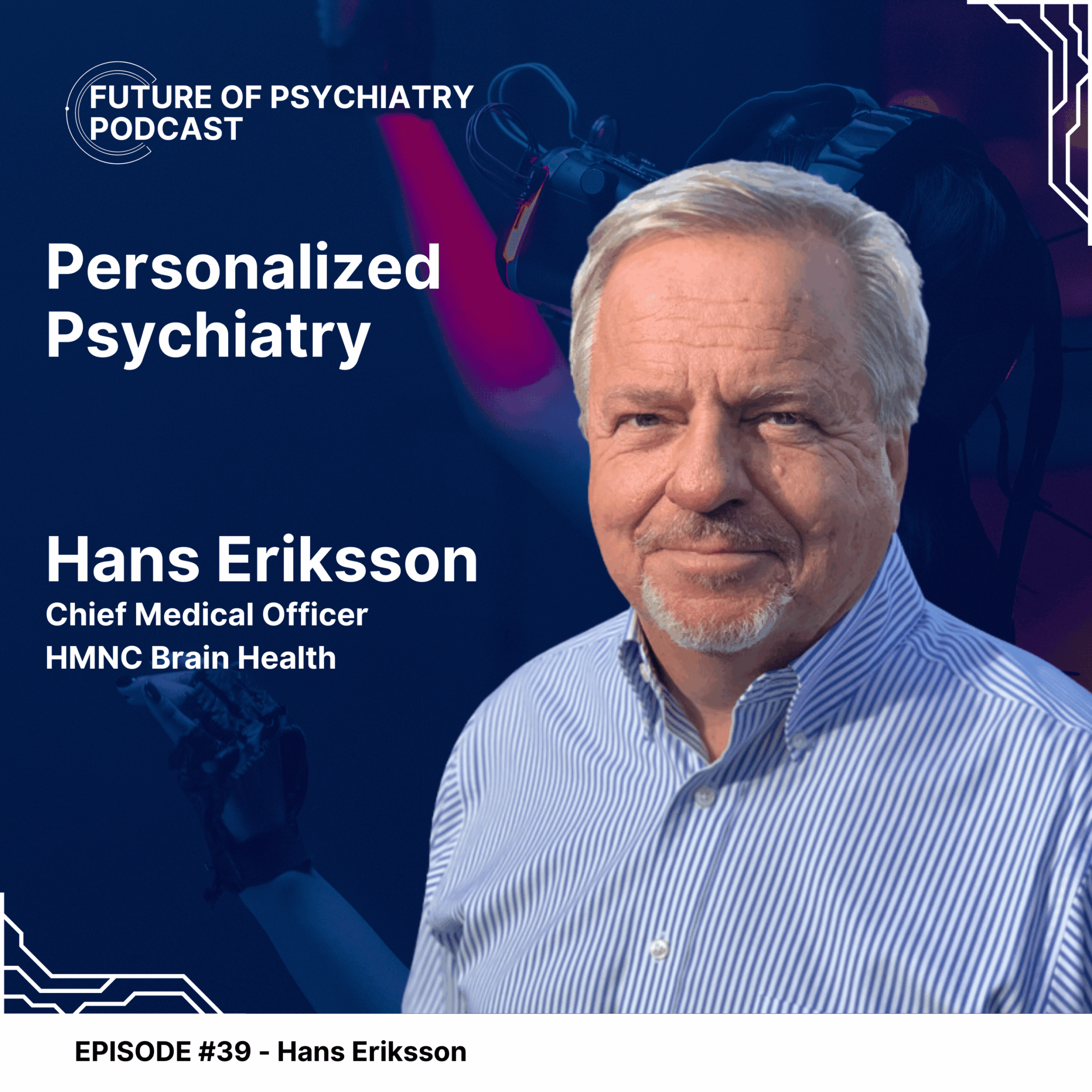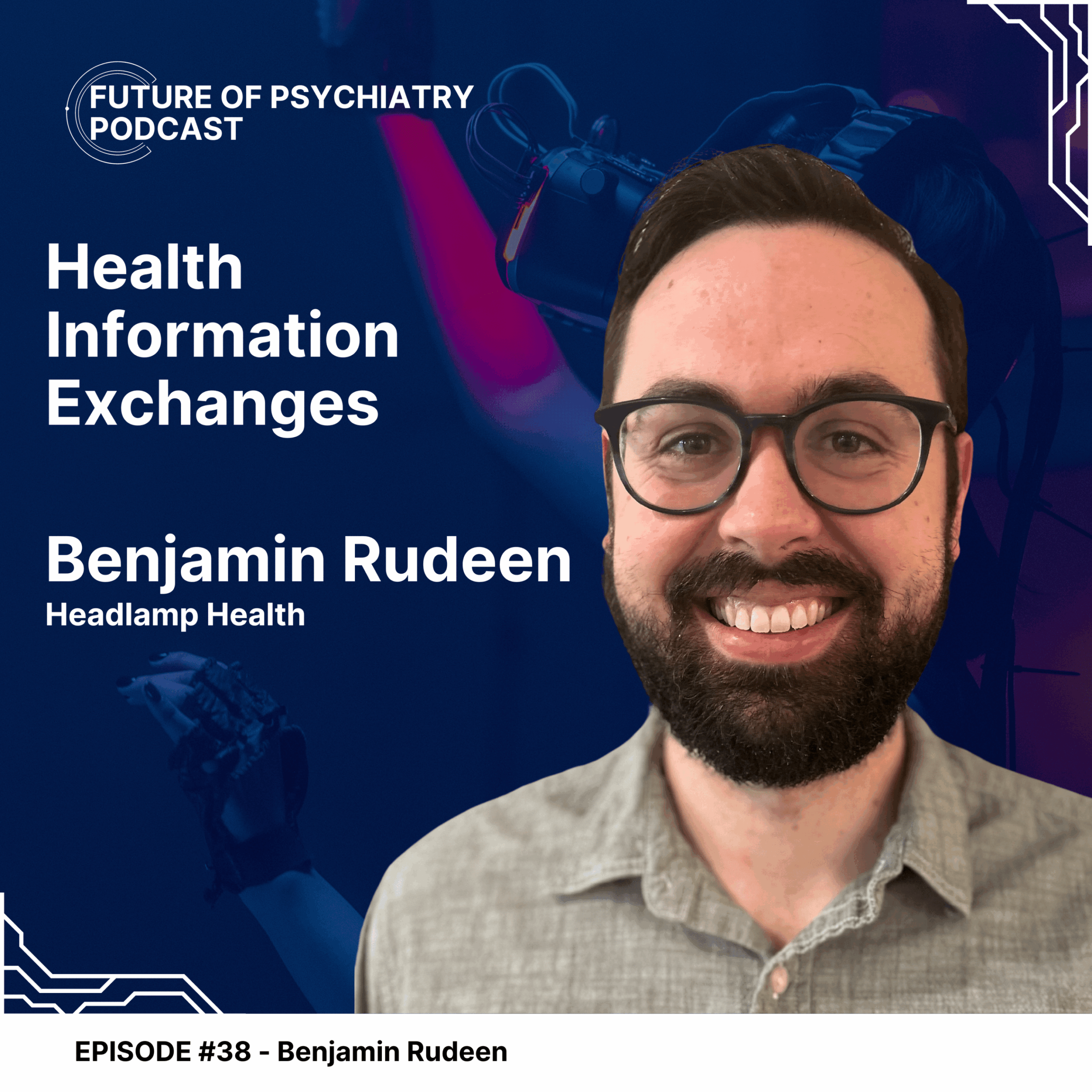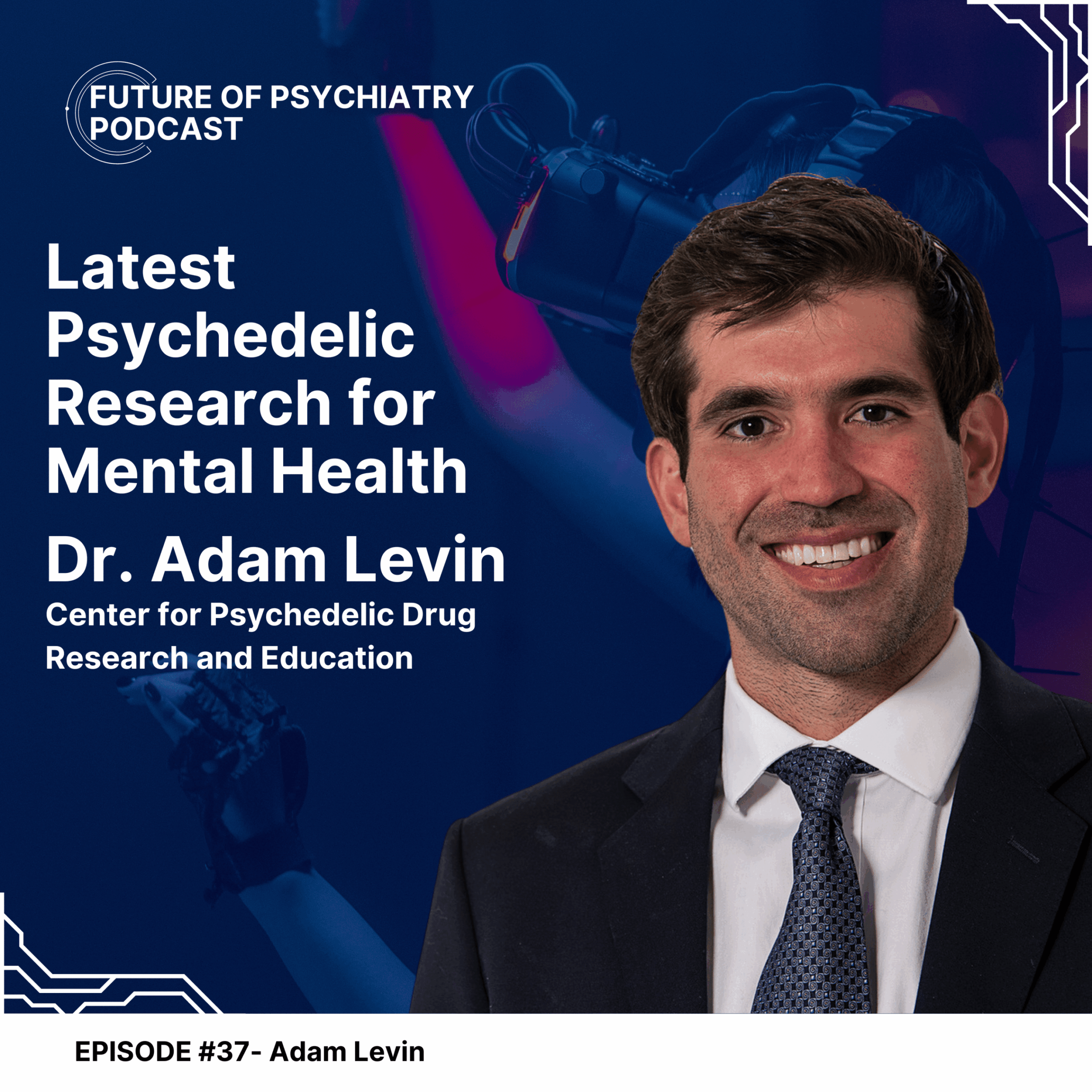#FuturePsychiatryPodcast discusses novel technology and new ideas in the field of mental health. New episodes are released every Wednesday on YouTube, Apple Podcasts, etc.
Episode Sponsors
This episode is brought to you by our sponsors:
Lindy.ai an AI based medical scribe that allows you to customize your notes automatically.
Sign up at: https://www.lindy.ai/bruce for a discount on your first month.
CharmHealth EHR system is an easy to use EHR with clear transparent pricing, pay as you go accounts with no contracts, very easy to onboard, and comes with chock-full of features.
Sign up today for free: https://ehr2.charmtracker.com/ehr/ehrSignup.sas?referer=Referred-by-Dr.Bruce-Bassi
Summary
Psychedelic Research for Mental Health: In this new episode, experts explore the burgeoning field of psychedelic psychiatry, highlighting the transformative potential of guided psychedelic experiences, personal narratives of dedication and curiosity among pioneers, the challenges of integrating psychedelics into clinical practice responsibly, and the broader ethical considerations. It also touches on technological innovations like artificial intelligence in mental health care. Overall, the conversation offers a glimpse into a future where unconventional therapies and cutting-edge technologies redefine mental health treatment with compassion and innovation.
Chapters / Key Moments
00:00 Intro
00:38 Exploring Psychedelics in Psychiatry
01:38 From Humanities to Neuroscience
04:27 Psychedelics: Insights and Challenges
11:20 Innovating Psychiatry
12:34 Psychedelics in Substance Use Disorders
15:13 The Historical Context of Psychedelic
17:36 Resources for Clinicians in Psychedelics
24:44 Psychedelics for Depression and PTSD
32:57 The Future of Psychiatry and Psychedelics
Psychedelic Psychiatry: Redefining Mental Health Treatment
In a dynamic discussion, experts explore the burgeoning field of psychedelic psychiatry, where unconventional therapies hold the promise of profound healing. Here’s a captivating glimpse into the transformative insights shared and the innovative approaches shaping the future of mental health care.
The Psychedelic Renaissance: Healing Beyond Convention
At the heart of this paradigm shift lies the exploration of psychedelics like psilocybin, found in “magic mushrooms.” Revelatory research suggests that guided psychedelic experiences can rank among life’s most transformative moments, challenging traditional psychiatric practices and offering holistic alternatives for mental health treatment.
Personal Journeys and Professional Dedication
The podcast illuminates the personal and professional odysseys of pioneers in psychedelic research, underscoring their unwavering commitment to advancing transformative therapies. Through tales of curiosity, skepticism, and determination, listeners gain insight into the human dimension of scientific exploration.
Navigating the Complexities of Therapy
However, the integration of psychedelics into clinical practice presents unique challenges, from ensuring patient safety to managing profound psychological experiences. Experts emphasize the need for meticulous preparation, therapeutic support, and ethical considerations in navigating these uncharted waters.
Balancing Promise with Responsibility
Beyond therapeutic applications, ethical considerations loom large in discussions surrounding the integration of psychedelics into mainstream psychiatry. Vigilance against exploitation and a commitment to patient safety remain paramount as the field ventures into uncharted territory.
Innovations in Mental Health Care
Innovations extend beyond psychedelics to encompass technological advancements like artificial intelligence, poised to revolutionize psychiatric care. By embracing these cutting-edge tools while upholding human-centered principles, psychiatry charts a course towards unprecedented progress and compassion.
Towards a Compassionate Future
The resurgence of psychedelics heralds not just scientific curiosity but a profound reimagining of mental health care. With pioneering research and ethical inquiry guiding the way, psychiatry embarks on a journey towards healing, understanding, and the realization of human potential.
Keywords: Psychedelic, Research, Mental Health, Transformative Therapy, Podcast Discussion, Psychiatry, Pioneers, Challenges, Integration, Technological Innovations, Artificial Intelligence
Resources
Adam Levin: Dr. Griffiths and his team found was that I believe about 80 percent of the people in the psilocybin group reported that it was a top five most important experience of their entire life. So this experience with psilocybin was up there with the birth of a child and the death of a parent. I remember this bell went off in my head and I kind of made this connection that wow, there is something here worth looking into.
And the neuroscience books that I’m reading do not cover this. This is not properly situated in our science right now. And also this inspiration, this idea that, wow, people are doing this. And I’m really forever grateful to Roland Griffiths for that.
Bruce Bassi: welcome to the Future of Psychiatry podcast, where we explore novel technology and new innovations in mental health. I’m your host, Dr. Bassi, an addiction physician and biomedical engineer. we are with the real Dr. Adam Levine, a psychiatrist and affiliate scholar with the Center for Psychedelic Drug Research and Education.
Dr. Levine is a resident in the Department of Psychiatry at Ohio State University School of Medicine, and he received his medical degree from Louisiana State University School of Medicine. We welcome Dr. Levine here today to enlighten us about a topic that is gaining so much popularity recently, in research and clinically, and it’s quite the large bandwagon that’s bigger and bigger.
And we wanna know, is this bandwagon warranted ? welcome Dr. Levine.
Adam Levin: Thank you. Thanks so much for having me.
Bruce Bassi: there’s a lot to talk about here and I know that you have a lot of research going on that you’re interested in, especially when it comes to psychedelics for addiction. And I want to get to all the most interesting tidbits about, this topic. when would clinicians
Think that this most useful to refer a patient to them, I wanna first get started in talking about how did you get interested in this field of psychiatry. Obviously there’s a lot of other fields that you could have focused your attention on, but what, is it about psychedelics that really interested you?
I.
Adam Levin: I was the type of kid who was really more of an English and history person high school. And then when I went to college, I was really focusing on kind of the humanities and with this kind of idea that I wanted to be, I. A physician. My, my father was a physician and I kind of split my coursework between the neurosciences and history and English and became fascinated with the time period of the 1960s and seventies and really just did like a, a minor in that time period and ended up taking a lot of history and reading a lot of literature and started making this connection that there was this cultural transformation, That occurred and that psychedelics, this drug were somehow a really big part of this. And I, I couldn’t wrap my head around it. I was reading a lot of the beat poets and trying to understand, hippies and all these other things. But in my neuroscience classes, I was also learning about drugs and learning about psychedelics and the paragraph.
I remember looking at my neuroscience book in this class called Drugs, brain and Mind, And the paragraph about, psychedelics was, you know, really short and there was a lot of other information about drugs. I remember thinking, this can’t possibly be the full story here. It’s not matching up with what I know about the cultural shift that happened.
And I remember a day that I went into the library and I was kind of googling the Psychedelics and psychiatry, and I found a paper by Roland Griffith, who unfortunately passed away a few months ago, and this was kind of one of the first studies in the early two thousands, which was in healthy volunteers comparing a dose of psilocybin.
So that’s in magic mushrooms. The active ingredient with Ritalin and what Dr. Griffiths and his team found was that I believe About 80% of the people in the psilocybin group reported that it was a top five most important experience of their entire life. So this experience with psilocybin was up there with the birth of a child and the death of a parent.
And I remember this bell went off in my head and I kind of made this connection that, wow, there is something here worth looking into. And the neuroscience books that I’m reading do not cover this. This is not properly situated in our science right now. And also this inspiration, this idea that, wow, people are doing this and I’m really forever grateful role in Griffith for that.
And, and it’s interesting ’cause my current mentor, Alan. Was working directly with Roland at Hopkins, so it came full circle, but that was kind of the inspiration for me. And then from that was in undergrad and from then on it was always, as I moved through medical school and into residency, it was always in the background that this is something really powerful worth looking into.
Bruce Bassi: When you talk about psychedelics and maybe the other patient, the patient you’re talking to, . thinks that they might have a such a profound experience on par with having a baby. that can be either really frightening for that person perhaps, or it could be exciting like, wow, there’s a potential out there something to help me.
That is really kinda miraculous in a way that has that, such profound impact on my psychology. And maybe that is the thing for me, How has your background and experience and research helped inform the way you talk about psychedelics with patients? Or help maybe inform them more correctly of some misconceptions they have.
Adam Levin: Yeah. So I think you’re highlighting something important, which is that I feel really a great responsibility about these experiences because they really are precious to the people who have them, and they really are important and they can be destabilizing. Right? You know, you’re talking about An experience like the birth, of a child that is significant. And to have that associated with going into a doctor’s office and taking a drug can really upset someone’s worldview. that’s important to me is that we’re very careful about how we frame these experiences and also how we support people and some things that have helped me. Interestingly, is that kind of grounding in literature history, and even exploring some of the spiritual literature because. I wanna support people going through these experiences and understand what they’re thinking about them. I don’t want to project my own sort of ideas, so I want to get a, as broad of a grounding in different spiritual traditions as well as psychiatric traditions, psychological traditions, so that I can provide that support. Because again, I think some, often people can be destabilized, and there’s a term for this called Ontological shock, which I think I believe Roland Griffiths coined, which is indicating this is really upsetting, can be upsetting to the base of what people believe. And so we have to be very careful and supportive in these situations.
Bruce Bassi: I feel like there are likely kind of two camps of individuals of patients who may be more or less inclined to think about psychedelics. There’s the ones who have tried a lot of other options and they feel like they’re at wit’s end. And else is there for me? There’s this new option, then there’s people who, For the reasons that you’re saying maybe have a biased interest towards this topic or idea, maybe they’ve, experimented with cannabis or they have a history or an interest in history from the sixties and seventies or aversion away from the pharmaceutical industry other sort of, biases towards trying to something like psychedelics.
do you think, those preconceptions, . Not only one could have implications on the placebo effect clinically, but also, a bias in clinical research, of patients who may be more interested in enrolling in a trial, at psychedelics, efficacy compared to placebo.
Maybe there’s a selection bias there. That shows that the psychedelics are maybe more effective whatnot. There’s a lower dropout rate because those people have some sort of background bias towards psychedelics. cause what you’re describing sounds to me, like in your history, kind of speaks to this as well and think clinically parallels my experiences when I’m talking to patients.
There are some who are just inherently interested in this topic.
for whatever reason, may, and then they bring up that in conversation.
Adam Levin: I think there’s a lot of things going on now. You know, I think there’s an initial interest from people who probably have had experiences with psychedelics or heard of psychedelics, and then this wave of interest in the media that’s happening over the last two, three years where people are coming in already with preconceived notions of what’s gonna happen, that this is some kind of miracle cure, which it certainly isn’t.
we can talk about that more, but, so there’s this positive valence right now, certainly is going to affect outcomes and there’s certainly an enhanced placebo effect, you know, that’s true of, of All interventions there. You see when a new intervention comes, even with something like Prozac or SSRI, there’s kind of this initial bump and initial positivity, and then it kind of flattens out, and so I think we’re due for that with psychedelics.
There’s no doubt, and we have to be aware of that when we’re designing trials. What we try to do now with trials is to recruit people specifically with very little or no experience with psychedelics because In that way, we can at least filter out some portion of the population that may already have a preconceived notion.
Now, it’s hard to filter out all the media bias,
but that’s just part of it,
Psychedelics and Addiction
Bruce Bassi: Let’s talk about psychedelics and addiction. I feel like that’s as much attention, maybe as just psychedelics in general for mood disorders. I was reading some article that mentioned that most people attribute some of the benefits to the insights that they gain while they were, influenced by the drug more acutely.
there’s that psychological component and then they are also psycho hypoplastic gins, and that helps with rewiring of the reward circuitry.
maybe you can help kind of weave . This question into what your current research is. maybe this is kind of accounts for why, psychedelics are perhaps on par or exceeding in effectiveness, compared to SSRIs.
Because with SSRIs you don’t have That
profound level of insight, as when you’re on a psychedelic. But yeah. Tell me a little bit about what you’re doing research on in regard to addiction in psychedelics.
Adam Levin: I think it’s worth digging into a little bit what you just highlighted. ’cause I think that’s actually at the center of the field right now, which is you have these subjective, these acute subjective effects. Where people are taking the drug, they’re sitting in a controlled environment for eight hours and they have these profound experiences. We can measure those subjective effects, and we know that those effects are correlated with outcomes. So higher the person’s insights. In that acute experience, the stronger the ratings of what we call mystical experience, the better the outcomes. And that’s true not just in addiction. It’s also true in depression and anxiety. So there’s this correlation that we know exists, and that’s been very well validated. On the other, hand, we have the biological effects, right? There’s some, you’re taking a medicine, there’s some effect in the brain and it’s causing, many people are, are looking into this idea of psycho costens, which means. increased, you know, dendritic growth changes in certain areas like the hippocampus are associated with depression. So there’s the biological side of it. And so what’s happening now, are asking questions like, well, we just take out the subjective effects of the drug so the person doesn’t have the trip and they just have those neurological psycho enogen effects?
And would that help with addiction and would that help with depression? Or are the subjective effects centrally important? Is it really the subjective effects now? I think it’s both. I think it’s probably a window of plasticity that’s being influenced by those acute subjective effects. I think that’s what makes these very unique as opposed to SSRIs mentioned. I think the combination of those two is really what’s leading to these profound changes. Now in our research, a lot of what we’ve been looking at recently, Are when we give a psychedelic, it’s in this container, this therapeutic container. We have about eight hours of therapy before We give the drug in a controlled environment with two therapists, and then we have therapy after about eight hours. And so we’re looking at different components of the container, like the therapeutic alliance and seeing if those things correlate with outcomes. And so in that way, we can kind of center in on some of these aspects that may be having more of an influence than we realize.
Bruce Bassi: So let’s maybe make this as useful as possible for a listener
who maybe treats patients with substance use disorders. They go through the traditional types of recommendations. Maybe patient’s, gone through, um, rehab program and now they’re dropped down to regular outpatient programming with a therapist.
Maybe they’re on Naltrexone or Vivitrol or Suboxone.
they probably have failed maybe a couple of those. I know there’s not formal recommendations for this, but
when would you recommend maybe anecdotally, what is the research telling us about? there is isn’t any answer to this question, but we could speculate who should be thinking about this as a recommendation for their patients?
Adam Levin: Yeah, that’s a good question. And we’re very early with this, but in terms of addiction, the furthest along are tobacco use disorder and cigarette use. So some of the early studies at Johns Hopkins were looking at tobacco use disorder, and what they found were that in this therapeutic container, right, with the preparatory therapy, which was in that case, I believe CBT, followed by the psychedelic, I believe there was about an 80% at one month. Of complete cessation of smoking. So that’s significant compared to what we have currently, which are nicotine replacement and Wellbutrin. that tells me that we might at some point be considering this as a first line treatment for smoking cessation. a bigger trial that’s ongoing. There’s NIH actually pouring funding into this. And so that may be the first clear evidence for psychedelics with Addiction. There’s also been a larger trial using placebo and alcohol use disorder, but this is an outpatient treatment. So this wasn’t you know, inpatient treatment and then received a psychedelic. This was people who were drinking but receiving outpatient substance use treatment.
And then, into this clinical trial. And again, we saw with this trial, large decreases in alcohol use, sometimes complete abstinence. That was better than placebo. So I think, you know, those are the two big areas I think people are looking into. Opiate use disorder, there’s a lot of promise there, but I foresee this being probably an outpatient or hospitalization level treatment where people maybe go through some sort of eight week or six week program in preparation for receiving the psychedelic, receive the psychedelic, receive the treatment, and then follow up after that. I think that’s probably where this is heading. Although again, you know, that’s kind my first guess, and it’s very early.
Carl Jung’s Influence on LSD Therapy
Bruce Bassi: That’s pretty interesting. Really. Interesting to think about the use of that for treating addiction. I know it might sound counterintuitive to individuals who might not have experience using Suboxone, for example, for opioid use disorder.
I think in the right conditions, the right patient, the right setting, the right access to it and the right, environment, like you’re talking about, think it
Can reduce the potential for that addictiveness with the the
substance.
Adam Levin: I often tell this story in my presentations, I think this is an older idea than we give credit for, in the early, you know, 19 hundreds and, before kind of the, advent of Alcoholics Anonymous, there was an American, named Roland Hazzard who traveled to Switzerland.
He was an alcoholic and he couldn’t get clean, and he traveled to Switzerland to see Carl Young, who, you know, you’ll probably know is kind of one of the, the forefathers of psychotherapy. And he went through this intensive therapy with Carl Young. He ended up sober and back in the United States, and he asked Carl Young, how do you think I can maintain my sobriety?
And how do you know that I’m cured? And Carl Young basically told him, I don’t know that you’re cured, but one way, one thing that you might seek out or open yourself to is a spiritual experience, a transforming spiritual experience, and Carl Young said, in my patient population, I’ve seen this work. I’ve seen people have these experiences leading to sobriety, and ultimately Roland Hazard ended up meeting Bill Wilson, who is one of the founders of Alcoholics Anonymous, and Bill Wilson starts this correspondence with Carl Young and tells Carl Young, Hey, I actually had a spiritual experience when I was in a hospital in New York. And that was my inspiration for founding Alcoholics Anonymous. And he describes being in this hospital, going through detoxification, seeing kind of a bright light, having all these realizations, essentially a psychedelic type experience. founding Alcoholics Anonymous and really found Alcoholics Anonymous with the idea. And he says this of opening people up to transformative experiences. what a lot of people don’t know about Bill Wilson is that in the sixties, He actually took LSD in a controlled context with therapists, and he ends up saying, writing actually to Carl Young, that this experience that I had with LSD was similar to my original spiritual experience that I had this hospital.
And he suggests even that LSD might be used as a treatment for alcoholism. So you, we have this kind of rich history, and this is something I’m fascinated by because A lot of researchers in this space have described rediscovering these older ideas that have been on purpose or perhaps just because psychiatry has moved so far away from this.
These ideas have been kind of glossed over or covered up, but they’re there. They’re in our history, and so I think that’s, that’s
Bruce Bassi: yeah, it is really interesting how it all kind of comes together.
Everything’s kind of interrelated in the psychiatry world.
I know there’s probably a lot of studies out there. I know you’re not recruiting for anything, that’s not why you’re here. But if somebody did want to get in more involved, either a clinician or a patient, what would you suggest?
Uh, other than Google searching, you know, do you have any
specific suggestions for them?
Adam Levin: you know maps, multidisciplinary Association of psychedelic studies, maps.org. They have been Funding this research since the eighties and have a lot of really good information about clinical trials and just in general. And they have things like trainings and other for clinicians and for patients.
They offer a variety of resources including, clinical trial websites and things like that. our, website, cp dre.org, where we have resources and plan to begin hosting clinician training because I, I think ultimately as these things become available, you mentioned, I think Having clinicians who are trained and having availability of training, because this is quite different than what we typically do will be very important. So I think, looking at maps, looking at our website, there’s another ciis.org, I believe Center for integral Studies California. can’t remember the exact name, but it’s CI iiss.org. I think is a really good resource as well, and they have different training opportunities,
Bruce Bassi: why do you think it’s important to have training for psychedelic treatment? But hopefully this is not opening up a can of worms of discussion, but I can’t recall. One, training or a certification process for marijuana, for instance. you feel like this would help
Preserve the integrity of the field as we approach psychedelics so that it doesn’t get too out of hand because there is this temptation and a tendency for the field to just suddenly explode with startups and this.
unquenched thirst and for the interest of psychedelics that can’t be met by the current resources. So all these other kind of sub, industries kind of pop up to capitalize on the demand.
can we do better
the, think it was about maybe five or 10 years ago when medical marijuana just kind of bloomed,
It’s an algae bloom. it was way too quick.
Adam Levin: You’re right. There’s like a whole ecosystem that comes up around these things with the hype. many of them, whether on purpose or on accident, are looking to take advantage of the situation. They’re not careful With medical marijuana. I agree. I think it was this kind of explosion that became uncontrolled and actually was kind of taken over by industry and in the same way that I think the has worked and, and so there’s all these interests that are pushing things, and I hope that we can be more responsible with the way that we bring psychedelics forward. They’re very, very different than cannabis in a lot of important ways.




